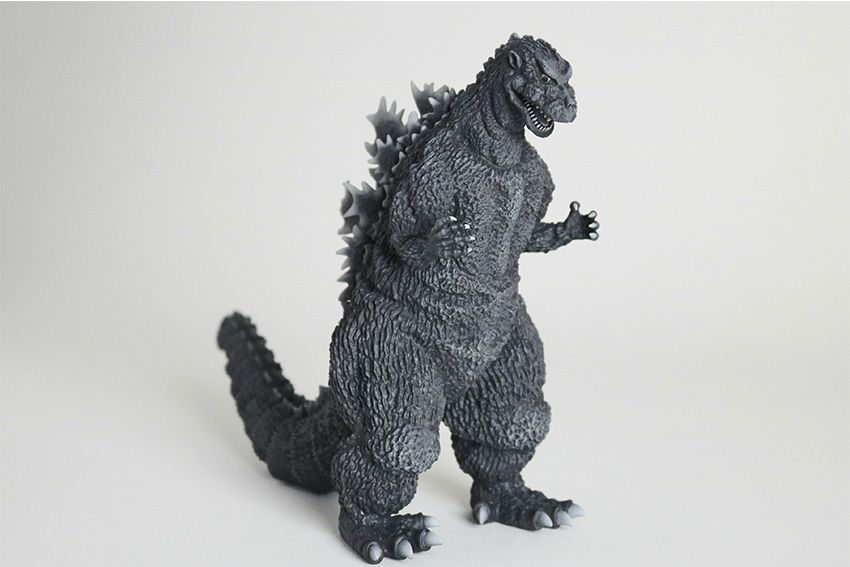The innovative toy and game maker is going global with big dreams.

Could you begin by introducing your company and the business areas that you operate in?
When founding X PLUS, I made it our mission to be “the company of the world, by the world, for the world.” Additionally, when deciding on what our corporate philosophy should be, decided on one built around honesty, sincerity, and creativity.
We initially started as an apparel company but there were many apparel related products that ended up getting disposed of or wasted by not only X PLUS but other companies as well. This went against both X PLUS’s corporate philosophy and mission so I did not believe that an apparel company could contribute as much as I would like to society. This led me to shift our company’s focus on lifestyle goods, only manufacturing products that the world may actually need. At that time, which was 20 years ago, there were not many fashion and lifestyle products available in the market so we decided to start producing both of these types of products, leading them to become our two main areas of business.
As a company I believe we have strived to contribute in various ways. People nowadays are frequently talking about issues such as increased CO2 emissions as well as other environmental issues.
One way is that instead of producing something, it made more sense to me to start developing software that could potentially contribute more to society which is how we got into the software business.
Additionally, we frequently imported products from China via air freight around 20 years ago but I chose to prohibit this and make it a company policy that we would no longer do so as this was not good for the environment.
We are also trying to contribute to the betterment of the environment is that we minimize the samples we produce as much as possible. We used to produce many samples before establishing contracts with our customers but have since shifted more to making our proposals through digital means that allow us to modify our samples using data. In many cases, we will only start producing our products after we’ve established a contract our customers.
Another way we are working to contribute to the environment is that we try to use up all our inventory before producing more products. In the past, we produced a lot of items and many of them would remain and go to waste if we could not sell all of them.
Nowadays, when working with our partners in the apparel industry, we are using internal systems more and more to effectively manage the orders. These systems allow the store floor and factories to be connected directly via the system. Our partners place orders for small amounts very frequently which helps ensure that we can sell all the products that we make.
Additionally, for our e-commerce based brands like Kota and Shonen-RIC, we produce and sell the products via their respective sites based on the amount actually ordered which virtually allows us to eliminate inventory for our products sold through e-commerce.
I would say these are the major trends occurring in our business and, moving forward, we are also considering our environmental impact. As I mentioned earlier, looking to the future, our business is shifting to game and software development. Of course, we will continue our lifestyle goods business but some of our business is shifting to data sales (3D models) and games.
Flame Ltd, one of our subsidiaries in the X PLUS Group and a game development company based in Tokyo has established an office in Saga City in Saga Prefecture, Kyushu which is allowing us to develop even more resources there. And starting next year, we plan on hiring more talent for this office and even train them there.
Neun Farben Corporation, another one of our companies in the X PLUS Group, is based in a suburb of Manila in the Philippines and has around 100 employees. We are training those local to the area work there as well and next year we are even planning to establish a school in the Philippines, on Mindanao Island in the south. We want to continue to contribute to local areas around the world.
We also have a company in India called Xannex Enterprises India Pvt. Ltd. It was established in 2013 but was unfortunately not profitable as a business. However, people in India have become more environmentally conscious which prompted us to start looking at jute which is a crop that is quite different from cotton. It grows on wetlands and is an indigenous plant to India, so we decided to shift from cotton to jute to produce our bags. Unlike cotton, jute does not require a lot of water to produce or farmland that could be used for other crops which makes it much better for the environment. As part of our PR efforts, we have been actively donating these bags to those with disabilities in South Korea through our South Korea branch and have even donated them for the Paris Paralympic Games. In January, we will participate in an exhibition that will be held in Frankfurt to promote not only our bags but also the use of jute.
Japanese products have dominated pop culture since the 1990s. For example, the 1990s saw the emergence of the Sony PlayStation, Nintendo, and Pokémon cards. Today, anime and manga are becoming increasingly popular around the world through streaming services and e-commerce. This makes it a lot easier for overseas customers to purchase products that they would not have been able to before. Now, with Japan receiving a huge increase in inbound tourism, many people are also taking the opportunity to buy these products while they are here. As the president of a company that is involved in this area, why, in your opinion, is Japanese pop culture currently so popular around the world?
Japanese culture is significantly different from that of European countries. Japanese culture strives to be simple and natural. For example, when you consider Hollywood movies, they are often focused on the commercial value, meaning that profitability is a major concern. This concern sometimes leads to changes in the story itself. However, I feel that Japanese movies are quite the opposite. Japanese movies are not profitability-based. Rather, they are based on Japan’s unique sense.
Also, Japan has had close ties to the rest of the world, resulting in a unique culture that is quite different from that of other Asian countries. Also, I believe that the fact that Japan was never invaded or colonized by foreign countries also contributed to this unique culture. I believe this is why people from other countries are attracted to Japanese culture.
Japan has seen record numbers of foreign tourists visiting Japan, with estimates that the number will reach 35 million by the end of this year. The estimated spend of these tourists is over JPY 7 trillion, which makes it Japan’s second-largest export after cars. Many people are taking advantage of the weakened JPY to purchase Japanese products. What impact has the record numbers of inbound tourists and the increased spending that they bring had on your business?
Since X PLUS’s business model focuses on selling out of all products we produce, the impact on our business has not been major. Additionally, our company’s policy is not sales-volume-oriented but I would say that inbound tourists have had a slight positive impact that resulted from how those overseas have evaluated our products. On the other hand, as you mentioned earlier, the interest in Japanese culture from those overseas has been increasing more and more so products such as Godzilla figures and game software developed in Japan are being increasingly promoted around the world. This, in turn, has had a positive impact on our business.

TM & © TOHO CO., LTD.

© 2022 SUMFP © TPC
It is very interesting to hear that you have decided to focus on software, as Japan has not been the most digitally savvy country in the past few decades. When it comes to digital competitiveness, Japan ranks 27th amongst OECD nations. It has been noted that Japan has not adapted to be a very digitally-savvy society, probably due to it already being very efficient in the analog world. In terms of your business, as a Japanese company, what can you offer in the digital realm that is unique and not already existing in the market, especially as you look to grow your business internationally?
Japanese companies rank low in digital competitiveness since the majority of Japanese companies are SMEs and do not have sufficient financial or human resources for digital related investments. However, our company started investing in digital-related areas about ten years ago, and we are getting close to where we want to be. I’d love for SMEs to take advantage of our software so we plan to offer our software at an affordable price which could set us apart while continuing to invest in digital technologies and digital human resources internally.
Also, the workflows and processes X PLUS is familiar with is the same or similar to other SMEs rather than that of larger corporations so we are developing our software in Japan. Unless people are familiar with our workflow, it can be challenging to develop software that meets the needs of other SMEs which is why we chose to develop our software here in Japan. We focus both on using traditional development as well as using low-code development platforms such as those provided by Microsoft which allows us to develop our software at a lower cost.
Do you have any plans in the future to offer your software services to overseas companies, or will they only be specifically for Japanese SMEs?
Yes, we would like to offer our software services to overseas companies in the future.
We saw that as a result of the COVID-19 pandemic, many people have turned to e-commerce and have begun buying products online. Japan alone saw a 13% increase in e-commerce. Many companies have begun to invest in their e-commerce sites not only for domestic customers but also to reach customers overseas. This is something that you have done with your Shonen-RIC online store, which is selling products to countries overseas, such as the US, Taiwan, and South Korea, among others. Are there any new territories that you are planning to expand your e-commerce capabilities to, and what are the most popular products that you have been selling through your e-commerce site?
We are only at the beginning phase of our e-commerce business. For example, our online sales in the US are quite low, and our sales in Europe are almost at zero. While we have had higher sales numbers in China and Canada, most of our e-commerce related sales come from Japan and Taiwan. We plan to expand our e-commerce business and eventually consolidate to one platform but, in doing so, logistics will of course become a challenge. The products that we sell through our e-commerce platform would depend on the item itself. Heavy items such as furniture are better for e-commerce and we are already facing logistics problems in Japan so if we deliver lightweight items such as clothes, it could become an even bigger logistical issue. These are the sort of things we must keep in mind when choosing what items to sell through e-commerce.
Global : https://ric-toy.com/
Japan: https://jp.ric-toy.com/
Last year, you set up a subsidiary group company, X-Plus North America, that not only sells Japanese goods in the US but also creates purposely designed products for the US market. How does your design process differ when it comes to the products that are specifically designed for the US market, and do you have any examples of products that you have designed and are looking to sell in the US?
In Japan, some of the intellectual properties we handle also have products produced by other companies as well. However, we, too, produce high-quality products for those same intellectual properties, and we have direct agreements with partners in the U.S., which allows us to design a variety of products for the US market more freely. For example, our director at our X PLUS North America branch in Texas works with our partners in the US, providing various proposals based on our design ideas. Once those proposals go through, we move to create the required 3D models in Japan, produce and paint those products, and then sell them in the US market through e-commerce. Going forward, we would like to focus on unique US comic characters for the US market which is something we have not done in Japan.
Will your strategy be only to sell those products in the US through e-commerce, or are you looking for distribution partners or retailers like Target or Walmart to sell your products?
Our strategy will only involve e-commerce but we are also planning to offer other types of products, such as Christmas ornaments, to some of the major distributors in the US.
We know that your company has been quite active in seeking new M&As, investments, and partnerships. You mentioned earlier that you acquired Flame and its subsidiary, Neun Farben Corporation, to strengthen your digital business. You also acquired Punx Inc. and invested in A Fashion Hong Kong and A&P Global Bag Manufacturing Inc. Are you currently looking for any new international partnerships, M&As, or investment opportunities, and if so, which product areas are you looking at?
We are always on the lookout for new partners but people are the most important thing to us. Our company policies and direction are important to us, such as contributing more to the environment, shifting more to software related business and the continued push towards becoming a more digitalized company. With that said, we’d like to focus more on those companies active in the gaming industry.
What types of partnerships are you interested in?
We are primarily interested in M&As. We’re currently working on virtual life related areas. which we started with one of our partners. If the direction and policies of X PLUS aligns with a particular person, we’d be very interested in starting something with them such as developing new products.
Also, I mentioned our South Korea branch earlier which we established in Seoul in July of this year. K-pop is very big there so we are looking into what we can do through this branch related to K-pop. If we can do something in this area, I believe we’d be able to build more synergy between South Korea and Japan.
Will that be in terms of software or creating characters for K-pop idols, for example? Do you have a specific vision for those synergies?
The director of our office in Seoul is currently discussions with his counterparts. I will be visiting South Korea in November so I am hoping to hear some great ideas from them.
Your company is involved in game design, and you offer services ranging from initial content to character development. It was also interesting to hear that you are currently working on virtual life as the gaming industry is going through some changes. On the one hand, there is a move towards free-to-play games that are funded through microtransactions, while on the other hand, people are moving into more VR and virtual gaming. What is your future vision for your gaming division, given these shifts in the industry that we are seeing?
Major companies dominate the current gaming industry. However, our focus is more on so-called Indie games. We want to create simple games for people’s leisure time as we want people to relax when playing our games.

© X PLUS Company Limited. All Rights Reserved
If we returned to interview you again in 2036 for the 50th anniversary of your company, where would you like the company to be by then? What is your vision for the future of X-Plus?
We’ve just started expanding into the US, but I would like to see X PLUS become an even more global company, expanding into other countries such as Europe and the Middle East as I feel that fits our mission of being “a company of the world, for the world, by the world.” Additionally, it would be great to continue connecting with more partners around the world as well.
Also, I would like to see more utilization of AI in the future. It would be great to reduce my workload in the future through such technologies. We are currently developing an avatar of me using AI-based technology. We have analyzed the meeting minutes of our management meetings for the past 20 years, including my responses and advice. I like to imagine that an AI avatar of me will be able to answer 70% to 80% of the questions I typically receive and may even be able to handle these types of interviews. Of course, the remaining 20 to 30% would be done in person. The alpha version of this avatar will be completed this year. Perhaps in 2036, even 70 or 80% of my work will be done by AI.
For more information, please visit their website at: https://xplus.co.jp/
0 COMMENTS